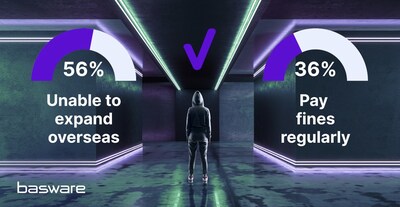
- Over half of companies are unable to expand overseas due to missed invoicing or tax compliance deadlines
- More than one-third have incurred fines by submitting incorrect tax audits
- $783 billion worth of non-compliant invoices last year
- In contrast, 83% with proper systems rarely receive fines
- “If you can’t be compliant, you can’t grow,” says Basware, highlighting the issues of incorrect tax and invoicing in its latest report
CHARLOTTE, N.C., Nov. 5, 2025 /PRNewswire/ — Over half (56%) of companies are unable to expand overseas due to missed invoicing or tax compliance deadlines, new data reveals.
Increasing financial regulatory demands combined with fragmented internal systems are creating a ‘compliance breaking point,’ preventing businesses from reaching their full global potential.
More than one-third (36%) of companies have incurred fines by submitting incorrect tax audits, highlighting how widespread tax compliance failures are and why businesses risk being held back on the global stage.
The findings come from Basware’s Beyond the Checkbox: Compliance as Strategy Report 2025, conducted by independent research firm Financial Times Longitude, which surveyed 400 finance leaders around the world.
Global compliance challenges which threaten expansion
Compliance failures such as e-invoicing and taxation are having a direct and measurable impact on financial operations and growth. Compliance failures occur when companies submit incorrect tax information, miss regulatory deadlines, or process invoices that should have never been paid because they were fraudulent.
Nearly four in ten companies (39%) have experienced invoice rejections due to tax or invoicing compliance errors. As international finance and tax regulations become more complex, the financial and reputational costs of falling short continue to escalate.
The impact of non-compliance extends beyond internal operations, directly affecting global supply chains and customer relationships. Companies that fail to meet local finance and tax regulations risk delayed shipments, rejected invoices, and strained partner relationships.
Basware’s analysis of 272 million invoices last year revealed that 57% still arrive as PDFs or paper documents rather than compliant e-invoicing formats. This represents $783 billion worth of non-compliant invoices flowing through global businesses. Despite mounting regulatory pressure and e-invoicing mandates, more than half of all business invoices remain stuck in formats that require manual processing, delay payments, and increase error rates.
These findings underline the growing complexity of global compliance and the urgent need for finance leaders to adopt modern, automated systems that can keep pace with constantly changing regulations. Without this shift, many organisations risk missing out on lucrative overseas opportunities due to inefficiencies and avoidable compliance errors.
CFOs see the risks, but struggle to act
While finance leaders clearly recognise the risks, many admit they lack the visibility and resources required to act effectively. The report found that 91% of CFOs believe limited visibility into compliance processes represents a major operational risk. Meanwhile, a third (32%) of organisations frequently breach financial compliance by submitting incorrect tax audits, revealing deep structural weaknesses in financial oversight.
This lack of transparency not only undermines confidence in financial reporting but also exposes companies to costly regulatory penalties and reputational damage. For many CFOs, improving compliance visibility has become a strategic imperative, yet manual processes and disjointed data systems continue to slow progress.
Markus Hornburg, Head of Compliance at Basware, commented:
“If you can’t be compliant, you can’t grow. Businesses are losing out on millions in potential revenue simply because their systems can’t keep up with global tax and invoicing demands. Most compliance challenges aren’t caused by misconduct, they stem from controllable technical issues, like manual invoices and unstructured PDFs.”
“CFOs face growing risks, from fines to lost revenue and strained partner relationships. AI-driven automation, supported by strong invoice practices, gives finance teams the ability to process invoices accurately, streamline audits, and stay ahead of changing compliance requirements, turning compliance from a burden into a strategic advantage.”
Companies with an embedded approach are better protected
Only a few organisations have fully embedded compliance capabilities within their operations. Only 29% have established comprehensive platforms to manage compliance effectively, while just 11% have cross-functional teams due to constraints in budget and tooling.
By contrast, companies that have adopted a more strategic and centralised approach are far better protected. Among organisations with embedded compliance systems, 83% report that they rarely receive fines and consistently outperform peers in revenue and profitability. Encouragingly, 92% of finance leaders plan to establish cross-functional teams, empowered by C-suite leadership, to manage tax and compliance more holistically.
This shift toward a proactive, embedded model highlights how compliance can move from being a reactive obligation to a driver of business performance and global resilience.
How One Global Company Automated Compliance to Unlock Global Growth
One example of how automation has turned compliance into a competitive advantage is French-based industrial manufacturer LISI Group. The company faced challenges managing invoicing and tax compliance across multiple countries, with manual processes and fragmented systems causing invoice rejections, delayed payments, and heightened risk of fines.
To address these issues, LISI implemented Basware’s Invoice Lifecycle Management platform, standardizing invoice processing and embedding compliance into its finance operations. As a result, the company now enforces structured data quality upstream, preventing errors such as missing PO numbers or incorrect delivery details before they cascade downstream.
LISI has seen measurable improvements, including faster invoice approvals, reduced audit preparation time, and enhanced compliance visibility across 13 countries, enabling the company to operate confidently in new markets.
By turning compliance into an operational advantage, LISI can expand globally without delays and focus on strategic growth rather than manual correction. LISI’s success illustrates how embedding compliance into finance operations can turn regulatory obligations into a source of competitive advantage for global growth.
About Basware
Basware is the world’s leading invoice automation company, helping finance teams gain complete control of every invoice, every time. Our Invoice Lifecycle Management platform ensures end-to-end efficiency, compliance and control for all invoice transactions. Powered by invoice-centric AI – trained on over 2 billion invoices – Basware’s Intelligent Automation drives real ROI by transforming finance operations. We serve 6,500+ customers globally and are trusted by industry leaders including DHL, Heineken and Sony. Fueled by 40 years of expertise with $10 trillion in total spend handled, we are pioneering the next era of finance. With Basware, Now it all just happens.™
Contact:
Abs Hassanali
Head of PR and Communications
[email protected]
Phone: +447400227701
Photo: https://mma.prnewswire.com/media/2810448/Basware_Study.jpg
Logo: https://mma.prnewswire.com/media/2583301/5594617/Basware_logo.jpg
View original content to download multimedia:https://www.prnewswire.com/news-releases/basware–the-one-thing-56-of-businesses-say-are-holding-them-back-from-expanding-302602222.html
SOURCE Basware





